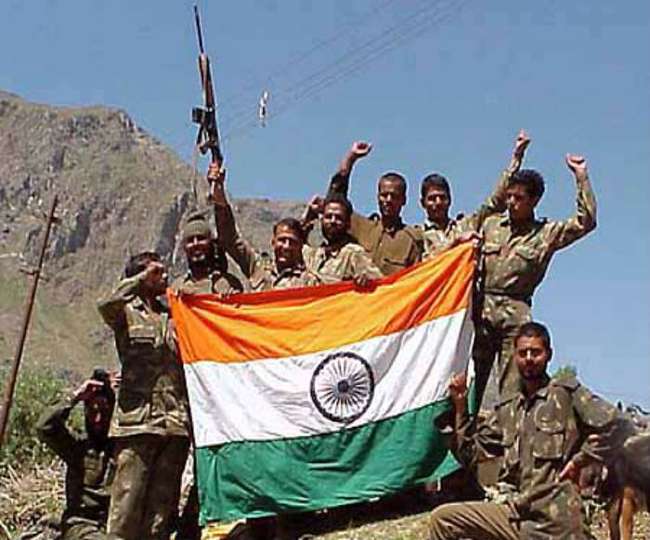New Delhi: India is celebrating Kargil Vijay Diwas today, a day commemorating India’s historic win against Pakistan on July 26, 1999. This day can never be celebrated to its fullest without remembering Captain Vikram Batra, who sacrificed his life for the country, and helped India take control of the eighty-degree steep and 17,000 feet high Point 4875 during the Kargil War.
The Kargil war began in May 1999 in Jammu & Kashmir’s Kargil area. During the two-month-long combat, India deployed numerous soldiers under ‘Operation Vijay.’ The battle was won by India on July 26, 1999. This battle against Pakistan was waged in three stages.
During the first phase, Indian troops controlled a portion of Kashmir, in the second phase, the Indian army began capturing important transit routes with the assistance of local shepherds.
In the third and last phase, the Indian Army completed the task of evicting Pakistani soldiers with the assistance of the Indian Air Force.
Kargil Vijay Diwas is the day to commemorate the victory in honour of the heroes of the Kargil War and pay homage to the brave soldiers who sacrificed their lives for their motherland.
Indian soldiers braved the chill and a disadvantageous position and drove the Pakistanis out of the motherland. Despite the circumstances, Indian soldiers displayed exceptional bravery. They ascended mountains when necessary, braved enemy fire from hills, and engaged in multiple hand-to-hand combats. Every year, the Prime Minister pays tribute to the soldiers at Amar Jawan Jyoti, which is located near India Gate.
Kargil War and Captain Vikram Batra
From a very young age, Vikram Batra aspired to become a part of the Indian Army. He grew up in a middle-class family from the Ghuggar village near Palampur of Himachal Pradesh. Batra was active in sports during his school time, especially in table tennis and karate, in which he was a green belt holder. He was born to teachers, his father being a principal in a government school, and his mother a teacher. It was after he enrolled on Bsc Medical Sciences at the DAV College in Chandigarh, that he became a cadet with the National Cadet Corps (NCC). Batra soon worked his way up to become the Senior Under Officer at his NCC unit and eventually marched at the Republic Day Parade in 1994.
It was after this, that he told his parents he wanted to join the army. Later, he enrolled in a MA English course at Panjab University, so he could prepare for the Combined Defence Services (CDS) exam.
Vikram Batra was among the only 35 recruits who cleared the CDS exam in 1996. He then joined the Indian Military Academy (IMA) in Dehradun and was part of the Manekshaw Battalion. He completed a rigorous 19-month training course and was commissioned into the Indian Army as lieutenant in the 13th battalion, Jammu and Kashmir Rifles. His first posting after his training period ended in Jabalpur was in Jammu and Kashmir’s Sopore. Sopore was an area of significant militant activity, and Batra had many skirmishes with the militants.
Batra’s battalion, the 13 JAK Rifles were to act as reserves to the 2nd battalion, the Rajputana Rifles, in the Kargil War. The war had already been underway for over a month when Batra joined in. On June 19, Batra and his men recaptured one of the most crucial peaks, peak 5140, despite the Pakistani soldiers having an advantage of sitting at the top.
In a similar order, Batraalong with his men was sent to take control of the eighty-degree steep and 17,000 feet high Point 4875. They advanced into the mission on July 7, but since the weather conditions weren’t favourable, the soldiers had difficulty reaching at the top. Even so, they reached their target, and this is when Batra got heavily wounded while rescuing another officer. Eventually, the Captain could not survive but India took possession of Point 4875 on the morning of July 8.
(Vinayak)

